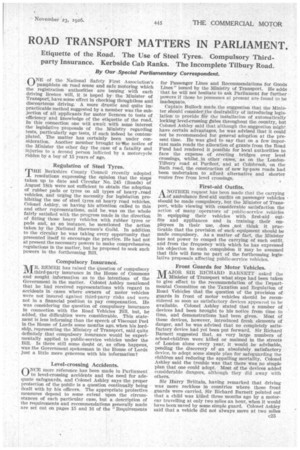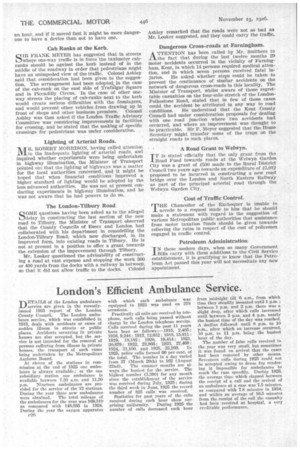ROAD TRANSPORT MATTERS IN PARLIAMENT.
Page 47

Page 48

If you've noticed an error in this article please click here to report it so we can fix it.
Etiquette of the Road. The Use of Steel Tyres. Compulsory Thirdparty Insurance. Kerbside Cab Ranks. The Incomplete Tilbury Road.
By Our Special Parliamentary Correspondent.
CINE of the National Safety First Association's pamphlets on road sense and safe motoring which the registration authorities are issuing with each driving licence will, it is hoped by the Minister of Transport, have some effect in checking thoughtless and discourteous driving. A. more drastic and quite impracticable method suggested by a member was the subjection of all applicants for motor licences to tests of efficiency and knowledge of the etiquette of the road. In this connection one will await with some interest the legislative proposals of the Ministry regarding tests, particularly age tests, if such indeed be contemplated. The matter has certainly been under consideration. Another member brought to henotice of the Minister the other day the case of a fatality and injuries to a Aecond person inflicted by a motorcycle ridden by a boy of 15 years of age.
Regulation of Steel Tyres.
THE Berkshire County Council recently adopted resolutions expressing the opinion that the steps taken up to date and Circular No. 245 (Roads) of August 18th were not sufficient to obtain the adoption of rubber pads or tyres on all types of heavy .road vehicles, and urging the necessity for legislation prohibiting the use of steel tyres on heavy road vehicles. Colonel Ashley, on having his attention called to this and other representations, said he was on the whole fairly satisfied with the,progress made in the ,direction of fitting those heavy vehicles with rubber tyres or pads and, as an instance, he mentioned the action taken by the National Showmen's Guild. In addition to the circular he was taking every opportunity that presented itself to encourage the practice. He had not at present the necessary powers to make comprehensive regulations in the matter, but he proposed to seek such powers in the forthcoming Bill.
Compulsory Insurance.
MR. REMER has raised the question of compulsory third-party insurance in the House of Commons and sought information as to• the intentions of the Government in the matter. Colonel Ashley mentioned that he had received representations with regard to accidents in cases where owners of motor vehicles were not insured against third-party risks and were not in a financial position to pay compensation. He was considering the question of compulsory insurance in connection with the Road Vehicles Bill, but, he added, the difficulties were considerable. This statement is less informing than the speech of Viscount Peel in the House of Lords some months ago, when his lordship, representing the Ministry of Transport, said quite definitely that compulsory insurance would be experimentally applied to public-service vehicles under the Bill. Is there still some doubt or, as often happens, was the Government spokesman in the House of Lords just a little more generous with his information?
Level-crossing Accidents.
ONCE more reference has been made in Parliament to level-crossing accidents and the need for adequate safeguards, and Colonel Ashley says the proper protection of the public is a question continually being aealt with by his officers. The appropriate protective measures depend to some extent upon the circumstances of each particular case, but a description of the requirements and recommendations generally made are set out on pages 15 and 16 of the "Requirements
for Passenger Lines and Recommendations for Goods Lines" issued by the Ministry of Transport. He adds that he will not hesitate to ask Parliament for further , powers if those he possesses at present are found to be inadequate.
Captain Bullock made the suggestion that the Minister should consider the desirability of introducing legislation to provide for the inStallation of automatically locking leveberossing gates throughout the country, but Colonel Ashley said that although the suggestion might have certain advantages, he was advised that it could not be recommended for general adoption at the present time. He was glad to say that on a few important main roads the allocation of grants from the Road Fund had rendered it possible for local authorities to face the expense of erecting bridges over level crossings, whilst in other cases, as on the LondonTilbury road at Purfleet, and at Colnbrook, on the Bath road, the construction if new by-pass roads had been undertaken to afford alternative and shorter routes free from level crossings.
First-aid Outfits.
A NOTHER request has been made that the carrying
of ambulance first-aid outfits on passenger vehicles • should be made compulsory, but the Minister of Transport, while viewing with considerable satisfaction the action of many operators of• public-service vehicles in equipping their vehicles with first-aid outfits and appliances and in training their employees in their use, does not think it practicable that the provision of such -equipment should be made compulsory. As a matter of fact, the Minister has not power to compel the carrying of such outfit, and from the frequency with which be has expressed his objection to such compulsion it may be assumed that this will form no part of the forthcoming legislative proposals affecting public-service vehicles.
Front Guards for Motor Vehicles.
MAJOR SIR RICHARD BARNETT asked the Minister of Transport what steps had been taken to give effect to the recommendation of the Departmental Committee on the Taxation and Regulation of Road Vehicles that the question of the provision of guards in front of motor vehicles should be reconsidered so soon as satisfactory devices appeared to be available. Colonel Ashley stated that a number of devices had been brought to his notice from time to time, and demonstrations bad been given. Most of these devices, however, introduced fresh elements of danger, and he was advised that no completely satisfactory device had yet been put forward. Sir Richard Barnett suggested that, as very large numbers of school-children were killed or maimed in the streets of London alone every year, it would .be advisable, pending the discovery of an absolutely satisfactory device, to adopt some simple plan for safeguarding the children and reducing the appalling mortality. Colonel Ashley said the trouble was that there was no simple plan that one -could adopt. Most of the devices added considerable dangers, although they did away with others.
Sir Harry Brittain, having remarked that driving was more reckless in countries where those front guards were carried, Sir Richard Barnett pointed out that a child was killed three months ago by a motorcar travelling at only two miles an hour, when it would have been saved by some simple guard. Colonel Ashley said that a vehicle did not always move at two miles an hour, and if it moved fast it might be more dangerous to have a device than not to have one.
Cab Ranks at the Kerb, SIR FRANK MEYER has suggested that in streets where one-way traffic is in force 'the taximeter cabranks should be against the kerb instead of in the middle of the roadway in order that pedestrians might have an unimpeded view of the traffic. Colonel Ashley said that consideration had been given to the suggestion. The arrangement had been adopted. in the case of the cab-rank on the east side of Trafalgar Square and in Piccadilly Circus. In the case of other oneway streets the placing of cab-ranks next to the kerb would create serious difficulties with the frontagers, and would prevent other vehicles from drawing up in front of shops and other business premises. Colonel Ashley was then asked if the London Traffic Advisory Committee was considering improvements in facilities for crossing, and he stated that the making of specific crossings for pedestrians was under consideration.
Lighting of Arterial Roads.
/f it. ROBERT MORRISON, having called attention -131.1 to the inadequate lighting of arterial roads, and inquired whether experiments were being undertaken in highway illumination, the Minister of Transport pointed ont that the lighting of highways was a matter for the local authorities concerned, and it might be hoped that when financial conditions improved a higher standard of lighting would be adopted by the less advanced authorities. He was not at present conducting experiments in highway illumination, and he was not aware that he had powers to do so.
The London-Tilbury Road.
SOME questions having been asked as to the alleged 1.3delay. in constructing the last section of the new road to Tilbury, the Minister of Transport observed that the County Councils of Essex and London had collaborated with his department in remodelling the London-Tilbury Road; which now discharged, in its improved form, into existing roads in Tilbury. He is not at present in a position to offer a grant towards the extension of the hnprovement through Tilbury.
Mr. Looker questioned the advisability of constructing a road at vast expense and stopping the work 300 or 400 yards from the docks with a railway in between. so that it did not allow traffic to the docks. Colonel
Ashley remarked that the roads were not so bad as Mr. Looker suggested, and they could carry the traffic.
Dangerous Cross-roads at Farningham.
A TTENTION has been called by Mr. Smithers to
the fact that during the last twelve months 29 motor accidents occurred in the vicinity of Earningham, Kent, in which 14 persons required medical attention, and in which seven persons received fatal injurieS. He asked whether steps could be taken to prevent the continuance of similar accidents on the network of dangerous cross-roads in this locality. The Minister of Transport, whilst aware of those regrettable casualties on the four-mile stretch of the LondonFolkestone Road, stated that in few of those cases could the accident be attributed in any way to road conditions. He understood that the Kent County Council had under consideration proposals for dealing with one road junction where two accidents had occurred, and where an improvement was thought to he practicable. Sir F. Meyer suggested that the Home Secretary might transfer some of the traps on the straight roads to such places.
A Road Grant to Welwyn.
IT is stated officially that the only grant from the Road Fund towards roads at the Welwyn Garden City was a grant of noo made to the Rural District Council two years ago towards an expenditure of £5,012 proposed to be incurred in constructing a new road bridge over the London and North Eastern Railwiy as part of tile principal arterial road through the Welwyn Garden City.
Cost of Traffic Control.
THE Chancellor of the Exchequer is unable to accede to a request made to him that he should make a statement with regard to the suggestion of various Metropolitan public authorities that assistance from motor taxation funds should be given towards relieving the rates in respect of the cost of policemen engaged in traffic control.
Petroleum Administration.
IN these modern days, when so many Government Bills carry with them additions to the Civil Service establishment, it is gratifying to know that the Petro' leum Act passed this year will not necessitate any new appointment.












































































































